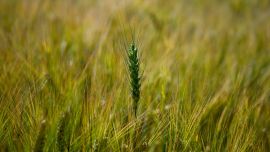A team of scientists from Argentina’s CONICET national scientific research institute has announced the discovery of a new species of megaraptor, a carnivorous theropod distinguished by its large claws on the forelimbs.
The dinosaur – named Joaquinraptor casali – was unearthed in the Colhué Huapi Lake Formation, an area that during the Upper Cretaceous lay in the south-central region of what is now Chubut Province, near the present-day cities of Comodoro Rivadavia and Sarmiento. The findings were published in the journal Nature Communications.
Based on the fossil evidence, experts estimate that Joaquinraptor grew to more than seven metres in length, weighed around one tonne, and was about 19 years old when it died.
“This carnivorous dinosaur was surely one of the apex predators of its ecosystem, and one of the youngest members of the group, since it may have died relatively close to the extinction of the dinosaurs around 66 million years ago,” said Lucio Ibiricu, a researcher at the Patagonian Geology and Palaeontology Institute (IPGP, CONICET).
The first bones were discovered in 2019, and several subsequent field campaigns allowed researchers to recover a partly articulated skeleton – one of the most complete megaraptor specimens found to date.
Scientists say Joaquinraptor represents the youngest geological record of Megaraptoridae, supporting the hypothesis that these predators survived until the very end of the Mesozoic era, just before the asteroid impact that wiped out most dinosaurs, leaving only their avian descendants.
Like other megaraptors, Joaquinraptor was carnivorous. Fossil evidence indicates it shared its environment with terrestrial crocodyliforms. The presence of a humerus – the only bone from another vertebrate found in the dig – lodged in its jaws suggests one of these “crocodiles” may have been part of its diet, though other ecological interactions cannot be ruled out.
The name Joaquinraptor pays tribute to the son of the study’s lead author, while casali honours Gabriel Casal, director of the Dr Rubén Martínez Vertebrate Palaeontology Laboratory.
– TIMES/NA
) New species of megaraptor


















Comments